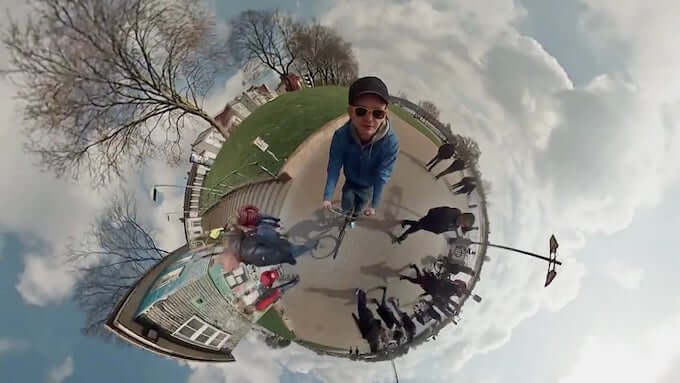Based on the comments and questions we are being asked, we noticed that there is a wide misconception on what stereoscopic videos are and how different they are from monoscopic videos.
Firstly all the 360 videos you are watching from YouTube and Facebook are monoscopic. However, stereoscopic VR videos add a coolness factors to videos, but in some cases, it is not what you need (yeah, read on to find out why).
The Ultimate Guide You Need Before You Start Making 360 Degrees Videos
Making 360 videos is more convenient and easy.You can now get rid of all the standard video limitations. Although the resolution while making 360 videos is
Difference between monoscopic and stereoscopic videos
A standard 360 video is a flat equirectangular spherical video similar to viewing the world map on a globe. If viewed using VR Headsets, it feels as if you are inside the globe and looking at the inner surface.
Thanks to the head tracking devices in place, whenever your head moves, these devices give you a feeling as if you are completely inside the scene.
Stereoscopic videos are a world apart from these. The addition of depth information within these videos is the main difference.
Using two lenses side by side gives each eye a different vantage point and you naturally experience the depth (as in 3D movies). But without proper planning and implementation these videos would look quite strange.
What Stereoscopic Videos Mean To VR
The stereoscopic videos or the 3D video experience in VR carries with it certain complexities. The phenomenon of stitching is far more complicated with these videos.
This is because if there is any flaw during combining video (technically called stitching) from different sources it is highly magnified in 3D. This means that the video could even unwatchable and irritating to the eyes.
There are actually many ill affects a poorly implemented stereoscopic 360 video footage can lead to. These range from general discomfort to the viewer eyes, headaches, nausea and dizziness.
However other than these health effects it can also cause quality issues. Objects present in a poorly implemented stereoscopic video can look like cardboard cutouts. Several optical flaws like chromatic aberration, for example, could become apparent.
Perfecting Stereoscopic videos for VR
You can avoid flaws in stereoscopic 3D 360 videos by shooting in controlled environments and planning to perfection.
Being self-aware of the stitch line and localizing subjects to defined quadrants while shooting are some of the things you need to worry about with these cameras.
Because of these limitations, stereoscopic 360 videos are not ideal for news gathering, live events or even sports or situations with variable and moving parts.
People are going to feel terribly uncomfortable trying to watch content like this in 3D. Still, we figure out the magical way to capture a perfect 3D shot with all kinds of motion and variables.
A lot of the 360 degrees photos and videos content we have around us would become inconsumable in stereoscopic 3D.
Probably only some kind revolution in displays could bring stereoscopic videos back on demand. Hence the focus currently is on making monoscopic 360 photos and videos only.
Monoscopic Cameras Rule The Market
Like already mentioned, monoscopic 360 photos and videos libraries already serve great content. There are many options in terms of 360 degrees cameras available at far lower costs compared to ones with stereoscopic filming capabilities.
In terms of resolution, monoscopic videos can have a double resolution to that of stereoscopic videos. So there’s absolutely no need for anyone who craves for a good resolution to shoot stereoscopic 3D videos. Especially right now when it’s kind of tricky to even get past the blurring.
Currently, the best 3D video content we see suitable for VR is very controlled and static and is offered by Felix & Paul Studios.
Image Credits: WSJ, FaceBook360
